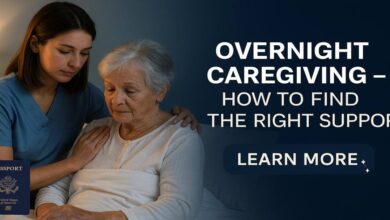
Caregiver Career Path – Check Here
If you’re considering a career in caregiving, here’s what you need to know upfront: entry-level positions like Home Health Aides or Personal Care Assistants typically earn between $28,000 and $36,000 per year, with room to grow as you gain experience or certifications.
Most roles require minimal prior experience, making it accessible for those ready to start helping others immediately. Caregiving is usually a hands-on job, with work taking place in homes, assisted living facilities, or hospitals, though some administrative or care coordination roles offer hybrid or remote options.
The job type ranges from part-time to full-time, giving you flexibility while making a tangible difference in someone’s life every day.
Understanding the Caregiver Role:
A caregiver provides support to individuals who need help with daily living activities, such as seniors, people with disabilities, or those recovering from illness. Responsibilities can include:
- Assisting with personal hygiene and grooming
- Managing medication schedules
- Preparing meals and monitoring nutrition
- Providing emotional support and companionship
- Coordinating appointments and transportation
Caregiving can take place in homes, assisted living facilities, hospitals, or specialized care centers.
Entry-Level Positions in Caregiving:
Most caregiver careers begin with entry-level roles that don’t require extensive training. Examples include:
- Home Health Aide (HHA): Supports clients with daily tasks at home.
- Personal Care Assistant (PCA): Provides personal and emotional care for clients.
- Certified Nursing Assistant (CNA): Works in hospitals or nursing homes, assisting with patient care under nursing supervision.
These positions often provide on-the-job training and a chance to gain hands-on experience.
Check Also: How to Become an Independent Caregiver
Skills That Make a Great Caregiver:
Success in caregiving depends on a combination of technical and soft skills:
- Compassion & empathy: Understanding and responding to clients’ needs.
- Communication: Clearly conveying information to clients and families.
- Patience & resilience: Handling challenging situations calmly.
- Attention to detail: Monitoring health, medications, and daily routines accurately.
- Time management: Balancing multiple responsibilities efficiently.
Advancing Your Caregiver Career:
The caregiver career path offers plenty of growth opportunities. With experience and additional certifications, you can move into higher-paying roles or specialized areas:
- Certified Nursing Assistant → Licensed Practical Nurse (LPN) → Registered Nurse (RN): For those pursuing clinical advancement.
- Geriatric Care Specialist: Focuses on elderly care, offering more responsibility and higher pay.
- Care Manager or Case Manager: Oversees multiple clients and coordinates care plans.
- Specialized Caregiver: Expertise in areas like dementia, hospice, or post-surgery recovery.
Continuing education, certifications, and professional networking are key to climbing the ladder in caregiving.
Caregiving Career Opportunities:
The healthcare industry is one of the fastest-growing sectors, and caregiving career opportunities are expanding rapidly. From home care roles to long-term care positions, there’s a clear path for anyone passionate about helping others.
Healthcare Career Path in Caregiving:
A career in caregiving can lead to various roles in healthcare, depending on your interests and training:
- Home Care Careers – Providing personal assistance, companionship, and support to clients in their own homes.
- Nursing Assistant Career – Working in hospitals, clinics, or long-term care facilities to assist patients with daily activities and basic medical tasks.
- Long-Term Care Careers – Focusing on elderly or chronically ill patients in nursing homes or assisted living facilities.
- Elderly Care Career Path – Specializing in geriatric care, dementia support, and age-related health needs.
Steps to Becoming a Professional Caregiver:
- Research the field – Understand the different caregiving roles and their requirements.
- Enroll in a certified caregiver program – Choose accredited programs that cover essential skills, patient care, and safety protocols.
- Complete caregiver training and certification – Obtain credentials that qualify you for professional caregiving jobs.
- Gain hands-on experience – Volunteer or work in home care or healthcare settings.
- Advance your career – Pursue specialized certifications or nursing assistant training to move up the healthcare career path.
Caregiver Training and Certification:
Investing in quality education is key. Best caregiver training programs provide:
- Patient care techniques and safety protocols
- CPR and first aid certification
- Communication and empathy skills
- Practical experience through internships or supervised care
Completing these programs boosts your employability and opens doors to higher-paying roles in the sector.
Career Growth in Caregiving:
The caregiving field offers strong growth potential. With experience and certifications, caregivers can advance to:
- Senior Caregiver or Home Care Manager
- Certified Nursing Assistant (CNA)
- Licensed Practical Nurse (LPN) or Registered Nurse (RN)
- Specialized roles in hospice care, dementia care, or rehabilitation
The demand for skilled caregivers ensures long-term job security and opportunities to expand your healthcare career path.
Why Choose a Career in Caregiving?
- Job stability: Aging populations create consistent demand for caregivers.
- Personal fulfillment: Making a meaningful impact on someone’s life every day.
- Flexible opportunities: Part-time, full-time, or shift-based positions.
- Pathway to growth: Clear opportunities to advance in healthcare or management roles.
Conclusion:
A career in caregiving blends purpose, growth, and financial stability, offering hands-on work that truly makes a difference. From entry-level roles to specialized or management positions, opportunities to advance are clear and rewarding. With compassion, patience, and dedication, caregivers build meaningful careers that touch lives every day.
Frequently Asked Questions:
What does a caregiver do?
A caregiver assists individuals with daily living activities, including personal care, medication management, meal preparation, emotional support, and coordinating appointments.
What skills are essential for a caregiver?
Compassion, patience, communication, attention to detail, and time management are key skills for success in caregiving.
Do I need prior experience to become a caregiver?
Most entry-level roles like Home Health Aide, Personal Care Assistant, or CNA require little to no prior experience, though training or certification is often provided on the job.




